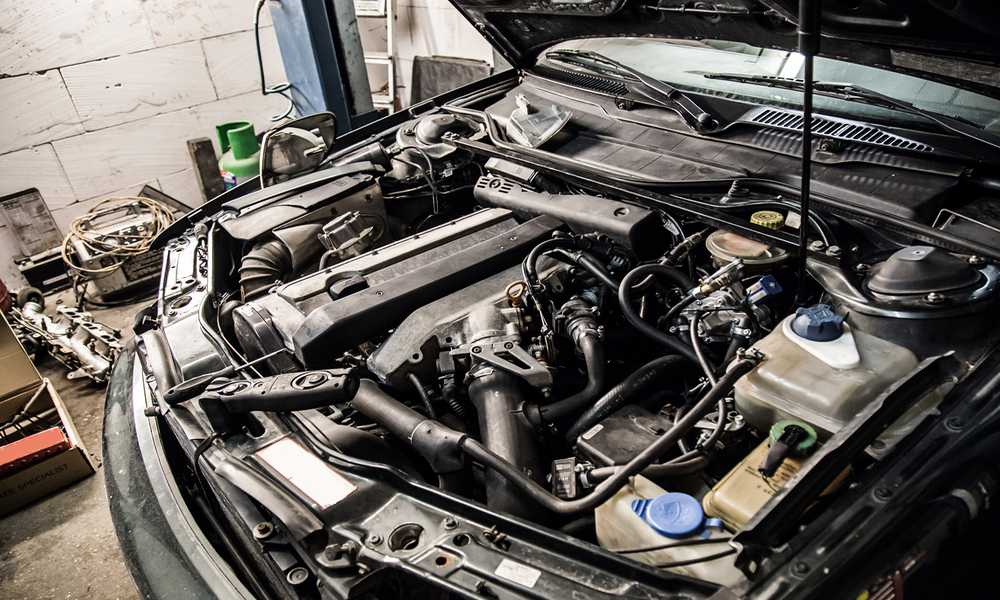Is your car making strange noises even after you’ve turned off the engine? It can be quite puzzling and even a bit concerning. Don’t worry, though – you’re not alone! Many car owners have experienced this odd phenomenon. In this blog post, we’ll explore the possible reasons behind why your car making noise after engine turned off. From damaged head gaskets to loose components, we’ll cover all the potential culprits and provide some helpful solutions to get your car back in tip-top shape. So let’s dive in and unravel this automotive mystery together!
Why is my car making noise after engine turned off?
1. Damaged or failed head gasket

One possible reason why your car is making noise after the engine is turned off could be a damaged or failed head gasket. The head gasket plays a crucial role in sealing the combustion chamber and keeping oil and coolant separate. So, if it becomes damaged or fails, it can lead to various issues.
When the head gasket is compromised, it can cause coolant to leak into the cylinders, resulting in steam escaping from the exhaust system even after you’ve turned off the engine. This can create an unusual noise as well as white smoke coming out of your tailpipe.
Another symptom of a damaged or failed head gasket is overheating. If your car’s temperature gauge consistently reads high or if you notice coolant leaks under your vehicle, it may indicate that your head gasket needs attention.
If you suspect a problem with your head gasket, it’s important to have it checked by a professional mechanic as soon as possible. They will be able to diagnose and repair any damage before further complications arise.
Remember that while this issue could be responsible for the noise after turning off your car’s engine, there are other potential causes that should also be considered and inspected by an expert technician for proper diagnosis and resolution.
2. Air in the wrong places
One possible reason why your car is making noise after the engine is turned off is due to air in the wrong places. Air pockets can get trapped in various components of the vehicle’s cooling system, causing unusual sounds once the engine shuts down.
When there is air in the cooling system, it disturbs the flow of coolant and creates gurgling or bubbling noises. This can happen if there was a recent repair or maintenance work done on the cooling system that wasn’t properly bled or if there is a leak somewhere.
Another possibility could be related to your car’s air conditioning system. If there are issues with its compressor or expansion valve, it may cause abnormal sounds when shutting off the engine because pressure imbalances occur within the A/C lines.
To fix this issue, you may need to bleed any air from your car’s cooling system by following specific procedures outlined in your owner’s manual. If you suspect an issue with your A/C system, it would be best to have it inspected and repaired by a qualified mechanic.
Remember, every vehicle has its own unique characteristics and quirks, so consulting with a professional technician will help pinpoint and resolve any issues related to air being in the wrong places within your car.
3. Coolant level is low
One possible reason why your car is making noise after the engine is turned off could be due to a low coolant level. The coolant, also known as antifreeze, plays a crucial role in maintaining the temperature of your vehicle’s engine. It circulates through the engine and radiator, absorbing heat and preventing overheating.
When the coolant level is low, it can lead to air pockets forming within the cooling system. These air pockets can cause gurgling or bubbling noises when they pass through various components of the system. Additionally, a low coolant level can result in inadequate cooling capacity, leading to increased friction and heat build-up within the engine.
Ensuring that your vehicle has an adequate amount of coolant is essential for proper engine function and longevity. If you suspect that your coolant level may be low, it’s important to check it regularly and top it up if necessary. However, if you consistently experience low coolant levels despite regular refilling, there may be an underlying issue such as a leak or malfunctioning component that requires professional attention.
Remember to always consult with a qualified mechanic or technician if you are unsure about any issues related to your vehicle’s cooling system.
4. Loose components
One possible cause for your car making noise after the engine is turned off could be loose components. When certain parts of your vehicle are not properly secured, they can rattle or vibrate, creating unusual sounds.
Loose components can include various elements within the engine bay, such as bolts, brackets, or even belts. Over time, with regular use and vibrations from driving on uneven roads, these parts may become loosened.
Another potential culprit could be loose body panels or trim pieces. If any exterior components are not securely fastened to the vehicle’s frame, they can generate noise when the car is stationary and experiencing wind resistance.
To determine if loose components are causing the issue, visually inspect both the engine compartment and exterior of your car. Look for any obvious signs of parts that appear out of place or have visible movement when touched gently.
If you identify any loose components during your inspection, it is recommended to have them tightened or repaired by a professional mechanic. Ignoring this issue could potentially lead to further damage or more serious problems down the road.
Remember that addressing loose components promptly can help prevent additional noises and ensure your vehicle operates smoothly and safely.
5. Low oil

When there is not enough oil in the engine, it cannot properly lubricate the moving parts, leading to increased friction and wear. This can result in loud grinding or knocking noises when the engine shuts down.
If your car is making noise after you turn off the engine and you suspect low oil levels may be causing it, you should check your oil level immediately. To do this, park your car on a flat surface and wait for the engine to cool down. Locate the dipstick under your hood, pull it out, wipe it clean with a cloth or paper towel, then reinsert it fully into its tube.
After pulling out the dipstick again, look at both sides to see where the oil level falls between two markers – usually labeled “minimum” and “maximum.” If the level is below or close to minimum, you will need to add more oil as soon as possible.
Remember that maintaining proper oil levels is crucial for preserving your car’s overall performance and preventing potential damage. Regularly checking your oil level and scheduling routine maintenance can help ensure that low oil does not contribute to any abnormal sounds coming from your vehicle after shutting off its engine
6. Blocked exhaust system
One of the potential reasons why your car is making noise after the engine has been turned off is a blocked exhaust system. The exhaust system plays a crucial role in removing harmful gases and reducing noise produced by the engine. However, over time, it can become clogged with debris or carbon buildup.
When the exhaust system is blocked, it disrupts the normal flow of gases, leading to increased backpressure. This higher pressure can cause abnormal sounds when you turn off your car’s engine as trapped air and gas try to escape through any available opening.
A common sign of a blocked exhaust system is a loud hissing or popping noise when shutting down your vehicle. Additionally, you may also experience reduced engine performance, decreased fuel efficiency, and even foul odors inside your car.
To address this issue, it’s important to have your exhaust system inspected by a qualified mechanic. They will be able to identify any blockages and recommend appropriate solutions such as cleaning or replacing affected parts.
Regular maintenance and keeping an eye on warning signs can help prevent a build-up in your car’s exhaust system and ensure smooth operations for years to come.
7. Loose hanging components
One possible reason why your car is making noise after the engine is turned off could be due to loose hanging components. These are parts that may have become detached or loosened during normal vehicle operation.
Loose hanging components can include things like exhaust pipes, heat shields, or even undercarriage panels. When these parts are not securely fastened, they can vibrate or rattle when the engine is shut down.
The noise from loose hanging components can vary depending on which part is affected. It may sound like a metallic rattling or clanging noise coming from underneath the vehicle.
If you suspect that loose hanging components are causing the noise in your car, it’s important to have them inspected and tightened as soon as possible. Driving with loose parts can not only create annoying noises but also pose potential safety risks if any of these components were to detach while driving.
A qualified mechanic will be able to diagnose and fix any issues related to loose hanging components in order to restore peace and quiet inside your vehicle. Remember, addressing these problems promptly can help prevent further damage and ensure a smooth driving experience for years to come.
8. Damaged hoses
One possible reason why your car is making noise after the engine has been turned off could be due to damaged hoses. Hoses play an important role in the cooling system of your vehicle, carrying coolant and other fluids to various parts of the engine.
Over time, these hoses can become worn out or develop cracks, leading to leaks. When you turn off the engine, pressure can build up in the cooling system as it cools down. If there are any damaged hoses present, this pressure can cause them to make noise as air or fluid escapes through the cracks or holes.
To fix this issue, it’s important to inspect all the hoses in your car’s cooling system for any signs of damage. Look for visible cracks or leaks and replace any faulty hoses as soon as possible. Regular maintenance and inspection of your vehicle’s cooling system can help prevent hose damage and ensure smooth functioning of your car.
Remember that addressing damaged hoses promptly not only prevents noise but also helps maintain proper engine temperature and prevents overheating issues. Trusting a professional mechanic for thorough inspections and necessary repairs will ensure that your car remains reliable on the road.
9. Problematic battery

The battery is an essential component of your car’s electrical system. It provides the power needed to start the engine and also supplies electricity to various parts of the vehicle when it’s not running. However, a problematic battery can be one of the reasons why your car is making noise after the engine is turned off.
If you notice strange noises coming from under the hood after shutting off your car, it could indicate that there are issues with your battery. One possible cause is a weak or dying battery that struggles to hold a charge. This can lead to irregular electrical activity and result in unusual sounds.
Another potential problem with the battery could be loose connections or corrosion on the terminals. When these connections become compromised, it can disrupt the flow of electricity and cause buzzing or clicking noises.
In some cases, a faulty alternator may also contribute to noise issues after turning off your car’s engine. The alternator charges the battery while you’re driving, so if it fails to do so effectively, it can impact its overall performance and generate odd sounds.
To address problems related to a problematic battery, you should first check its voltage using a multimeter tool. If necessary, recharge or replace the old battery with a new one. Additionally, inspecting and cleaning any corroded terminals can help restore proper electrical contact.
Remember that addressing any concerns related to your car’s electrical system should always be done by professionals who have expertise in dealing with automotive batteries and wiring systems
How to fix car making noise after engine turned off?
If you’re experiencing a strange noise coming from your car after turning off the engine, don’t panic. There are several potential reasons for this issue, but fortunately, there are also solutions.
Check for any loose components under the hood. Sometimes vibrations can cause parts to become loose and create rattling or knocking noises. Tightening these components may solve the problem.
Next, inspect your coolant level. A low coolant level can result in air pockets forming in the cooling system, leading to gurgling or hissing sounds when the engine is shut off. Topping up the coolant should help eliminate this issue.
Another possible culprit is a damaged or failed head gasket. This can cause abnormal noises as well as other symptoms like overheating or white smoke from the exhaust. If you suspect a faulty head gasket, it’s essential to have it repaired promptly by a professional mechanic.
Additionally, consider checking for blocked exhaust systems or damaged hoses that could be causing unusual sounds when the engine shuts down. Clearing any blockages or replacing damaged components may resolve these issues.
If your car has an older battery that’s nearing its lifespan, it could be contributing to odd noises after shutting off the engine. Consider having your battery tested and replaced if necessary.
Remember that while diagnosing and fixing some of these issues yourself may be possible for experienced DIYers, it’s always best to consult with a qualified mechanic for proper diagnosis and repair.
Why is my car making knocking sound after turning engine off?
One common noise that car owners may encounter is a knocking sound after turning off the engine. This can be concerning, but it’s important to understand the potential reasons behind this noise.
One possibility is that there is a buildup of carbon deposits in the cylinders or on the spark plugs. When you turn off the engine, these deposits can ignite and cause a knocking sound as they burn away.
Another possible cause could be worn-out engine bearings. Over time, these bearings can become damaged or degraded, causing them to make noise when the engine is turned off.
Additionally, if your car has a turbocharger or supercharger system, it could be related to their operation. These systems use compressed air which can create pressure build-up and result in strange noises when shutting down.
It’s also worth noting that certain types of fuel additives can lead to knocking sounds after turning off the engine. These additives are designed to clean out carbon deposits but may produce temporary knocking sounds during their cleaning process.
While a knocking sound after turning off your car’s engine may seem alarming, it often has logical explanations such as carbon deposit ignition or worn-out engine bearings. It’s always best to consult with a professional mechanic who can diagnose and address any underlying issues properly.
Final thoughts

If you’ve noticed that your car is making noise after the engine is turned off, it’s important not to ignore it. While some noises may be harmless, others could indicate underlying issues that require attention.
Remember to check for common culprits such as a damaged or failed head gasket, air in the wrong places, low coolant level, loose components, low oil levels, blocked exhaust systems, loose hanging components, damaged hoses, or a problematic battery. Identifying and addressing these issues early on can help prevent further damage and costly repairs down the road.
However, if you find yourself asking “Why is my car making knocking sound after turning off the engine?” it’s crucial to have a professional mechanic inspect your vehicle. Knocking sounds can be indicative of more serious problems like worn-out engine parts or faulty ignition systems.
In any case, regular maintenance and prompt attention to unusual noises are essential for keeping your car running smoothly and ensuring its longevity. Don’t hesitate to seek assistance from an experienced mechanic who can diagnose and fix any issues with your vehicle.
By being proactive about addressing strange noises coming from your car after shutting off the engine, you’ll not only protect yourself from potential breakdowns but also maintain peace of mind knowing that your vehicle is in good working condition. So listen closely to those post-engine-off noises and take action when necessary – your car will thank you!



